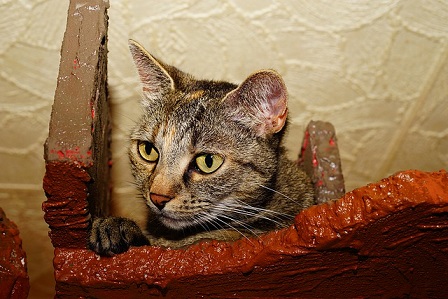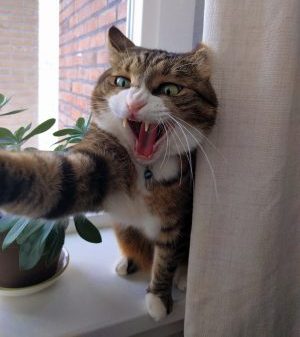
For new cat owners, understanding their cats and their different emotional states can be a whirlwind experience. According to Ohio University “Life stressors are events and changes in your cat’s environment that may affect her well-being”. Cats are extremely sensitive to their surroundings and any changes in it affects them to the point of causing stress. One such difficult things to spot are the signs of a stressed cat. How can you recognize stress in cats? What can you do to help kitty alleviate this stress? Well, you’re about to find out.
SIGNS OF A STRESSED CAT
The good news is that your cat may have been speaking to you with her plethora of unusual behaviors and physical signs. You only have to learn to spot these signs when they emerge.
Behavioral Signs
- Excessive Scratching on the Furniture. Cats will typically scratch furniture when they’re bored, tensed, or to mark their territory, and they’re also likely to scratch the furniture more often when they’re stressed.
- Urinating or Spraying on Furniture and Anywhere Around the House. A cat that has been trained to use her litter box has no business peeing around the house, except she has a urinary tract disorder. When she’s marking her territory around the house while standing with her tail in the air, then it’s a major sign that something or someone in the house is making her uneasy and stressed.
- A Stressed Cat Will Hide More Often. If kitty feels threatened, stressed, or unsafe in her surroundings, she’s going to hide more often, crouch, and make herself less visible to the cause of the stress or what she perceives as danger. If your cat usually says hi! at the door when you get home, he may stop welcoming you.
- Loss of Appetite. If you realize that kitty suddenly stops eating as well as she used to, then something is definitely bothering her or wrong with her health. Since cats are easily stressed, they experience a decrease in appetite. If kitty completely loses appetite, it may be a sign of an underlying condition, and you should take her to the vet immediately.
- Isolation or Withdrawal. Despite public opinion, Cats are actually social animals that form strong bonds with their owners and other animals in the home. When kitty starts withdrawing herself from the rest of the family, or isolating herself completely and looking lethargic, then that’s a big sign that she’s stressed.
- Aggressive Behavior Towards Others. Cats are usually aggressive when they’re defensive, trying to get you to stop over-petting them, or simply in an unhappy and stressed mood. If your cat hisses at you or your friends, bites or scratches you when you try to pet her, or gets aggressive with other cats in the house, or other pets, it could be a sign of stress. Unlike kids that you can bribe with treats, don’t try to force your way with an aggressive cat. Just leave her alone and give her space.
- Changes in Routine. While we try to teach our cats certain things, every cat has a daily routine they like to stick with. When a cat’s routine suddenly changes and does not quickly return to normal, it could be a sign of stress and her way of adjusting to her stressors.
- Excessive Meowing. When your cat meows excessively and repeatedly, it could mean so many things. She could be hungry, lonely and wants attention, could be a sign of illness, or she could be stressed. If you’ve tried giving her food and attention and she’s not responding positively, she’s probably stressed and should be left alone for a while.
- Excess Grooming. Just like humans have a way to deal with stress, cats resort to grooming when they feel stressed. This is because licking themselves produces feel-good endorphins, which are chemical substances that make the sensation of self-grooming feel comforting. However, excessive grooming can result in hair loss and skin sores, which are also physical signs of stress to look out for.
- Repeated Pacing, Loud Meowing, Over-Responsiveness. When your cat seems to always be on high alert, seemingly jumping or jerking at the slightest sounds or movement in its environment, your kitty is likely stressed out. Repeatedly pacing around the house while meowing loudly is another tell-tale sign of stress in cats.

HOW TO REDUCE STRESS FOR YOUR CAT
Every cat is different, and what may trigger stress in my cat may differ from yours. However, cat behavioral specialists have identified some of the common causes of stress and how you can help them overcome these stressors. Below are ways you can help kitty feel much better.
- Keep Your Cat Healthy. A healthy cat is a happy cat. Ensure that you feed your cat nutritious meals, exercise your cat regularly, and don’t skip your annual veterinary visits. If an underlying problem is stressing kitty, your Veterinarian will identify any such problems in its early stages.
- Create a Safe space for Your Cat. If your cat seems stressed by your guests, animals in the house, or something you recently introduced to the house, create a safe space for her to go to and relax. This is where getting a tall cat tree comes in handy. There, she can be away from all the commotion in the house and feel safe.
- Keep Your Cat Stimulated. You can help your cat stay active, happy, and stimulated throughout the day using catnip toys, puzzles, games, and food, providing environmental enrichment for her while you’re away.
- Ease Your Cat Through Life Transitions. If you have to move to a new location at a particular time, know that it’ll be a downright stressful time for both you and kitty. Whatever you do, ease her into the new surroundings.
- Ensure That The Litter Boxes Are kept Clean. While it’s important to have enough litter boxes around the house, ensure that they are kept as clean as possible.
- Try as Much As Possible to Keep the Noise Down. Loud noise can frighten and stress your cat. So try to rid your environment of noise pollutants.
- You Can Try Calming Pheromone Diffusers and Sprays. One excellent example is the Feliway diffuser and sprays which are clinically proven to help reduce spraying, scratching, hiding, and other stress-related behaviors.
While stress is not entirely avoidable, you can limit your cat’s exposure to stressors and help her feel more comfortable in her surroundings, whether you have guests over or not. The key to a happy cat isn’t always too far away. Simply look for the signs of stress and eliminate them before they take over completely.
Some content contains affiliate links or samples for reviews; I may receive compensation. Learn more
Leave a Reply